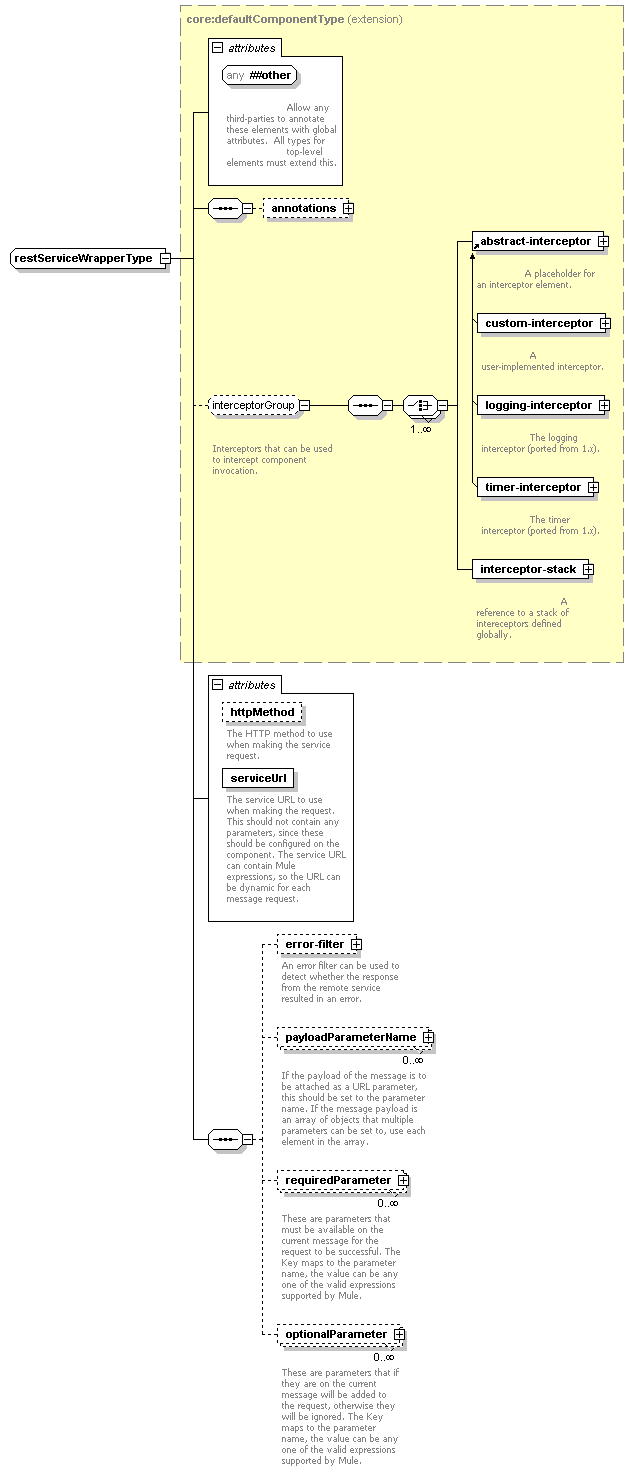
Namespace: |
|
Content: |
complex, 2 attributes, attr. wildcard, 7 elements |
Defined: |
globally in mule-http.xsd; see XML source |
Includes: |
definitions of 2 attributes, 4 elements |
Used: |
at 1 location |

XML Representation Summary |
|||||||||
| <... | |||||||||
|
|||||||||
| {any attribute with non-schema namespace} | |||||||||
| > | |||||||||
|
|||||||||
| </...> | |||||||||
Type Derivation Tree |
| <xsd:complexType name="restServiceWrapperType"> <xsd:complexContent> <xsd:sequence> <xsd:complexType> <xsd:sequence> </xsd:sequence> </xsd:complexType> </xsd:element> <xsd:element maxOccurs="unbounded" minOccurs="0" name="payloadParameterName" type="mule:valueType"/> <xsd:element maxOccurs="unbounded" minOccurs="0" name="requiredParameter" type="mule:keyValueType"/> <xsd:element maxOccurs="unbounded" minOccurs="0" name="optionalParameter" type="mule:keyValueType"/> </xsd:sequence> <xsd:simpleType> <xsd:restriction base="xsd:NMTOKEN"> <xsd:enumeration value="DELETE"/> <xsd:enumeration value="GET"/> <xsd:enumeration value="POST"/> </xsd:restriction> </xsd:simpleType> </xsd:attribute> </xsd:extension> </xsd:complexContent> </xsd:complexType> |
Type: |
|
Use: |
optional |
| enumeration of xsd:NMTOKEN |
Enumeration: |
"DELETE", "GET", "POST" |
Default: |
"GET" |
Type Derivation Tree xsd:NMTOKEN (restriction) |
Derivation: |
restriction of xsd:NMTOKEN |
|||
Facets: |
|
|||
| <xsd:attribute default="GET" name="httpMethod" use="optional"> <xsd:simpleType> <xsd:restriction base="xsd:NMTOKEN"> <xsd:enumeration value="DELETE"/> <xsd:enumeration value="GET"/> <xsd:enumeration value="POST"/> </xsd:restriction> </xsd:simpleType> </xsd:attribute> |
Type: |
xsd:anySimpleType |
Use: |
required |
| <xsd:attribute name="serviceUrl" use="required"/> |
Type: |
anonymous complexType, complex content |
| <xsd:element maxOccurs="1" minOccurs="0" name="error-filter"> <xsd:complexType> <xsd:sequence> </xsd:sequence> </xsd:complexType> </xsd:element> |
Type: |
mule:keyValueType, empty content |
| <xsd:element maxOccurs="unbounded" minOccurs="0" name="optionalParameter" type="mule:keyValueType"/> |
Type: |
mule:valueType, empty content |
| <xsd:element maxOccurs="unbounded" minOccurs="0" name="payloadParameterName" type="mule:valueType"/> |
Type: |
mule:keyValueType, empty content |
| <xsd:element maxOccurs="unbounded" minOccurs="0" name="requiredParameter" type="mule:keyValueType"/> |
| XML schema documentation generated with DocFlex/XML RE 1.8.5 using DocFlex/XML XSDDoc 2.5.0 template set. All content model diagrams generated by Altova XMLSpy via DocFlex/XML XMLSpy Integration. |